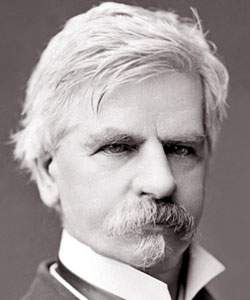Nathaniel Prentice Banks (Congressional Biographical Directory)
Reference
BANKS, Nathaniel Prentice, a Representative from Massachusetts; born in Waltham, Mass., January 30, 1816; attended the common schools; a machinist by trade; editor of a weekly paper in Waltham, Mass.; clerk in the customhouse in Boston, Mass.; studied law; was admitted to the Suffolk County bar and commenced practice in Boston; member of the State house of representatives 1849-1852, for two years serving as speaker; member of the State constitutional convention of 1853; elected as a Democrat to the Thirty-third Congress, as the candidate of the American Party to the Thirty-fourth Congress, and as a Republican to the Thirty-fifth Congress and served from March 4, 1853, until he resigned December 24, 1857, to become Governor; Speaker of the House of Representatives (Thirty-fourth Congress); Governor of Massachusetts from January 1858, until January 1861; moved to Chicago, Ill.; vice president of the Illinois Central Railroad; entered the Union Army as a major general of Volunteers May 16, 1861; honorably mustered out August 24, 1865; returned to Massachusetts; elected as a Republican to the Thirty-ninth Congress to fill the vacancy caused by the resignation of Daniel W. Gooch; reelected as a Republican to the Fortieth, Forty-first, and Forty-second Congresses and served from December 4, 1865, to March 3, 1873; chairman, Committee on Foreign Affairs (Thirty-ninth through Forty-second Congresses); unsuccessful Liberal and Democratic candidate for reelection in 1872 to the Forty-third Congress; member of the State senate in 1874; elected as an Independent to the Forty-fourth Congress and as a Republican to the Forty-fifth Congress (March 4, 1875-March 3, 1879); unsuccessful candidate for renomination in 1878 to the Forty-sixth Congress; appointed United States marshal on March 11, 1879, and served until April 23, 1888; elected as a Republican to the Fifty-first Congress (March 4, 1889-March 3, 1891); chairman, Committee on Expenditures in the Department of the Interior (Fifty-first Congress); unsuccessful candidate for renomination in 1890 to the Fifty-second Congress; died in Waltham, Middlesex County, Mass., September 1, 1894; interment in Grove Hill Cemetery.
“Banks, Nathaniel Prentice,” Biographical Directory of the United States Congress, 1774 to Present, http://bioguide.congress.gov/scripts/biodisplay.pl?index=B000116.




